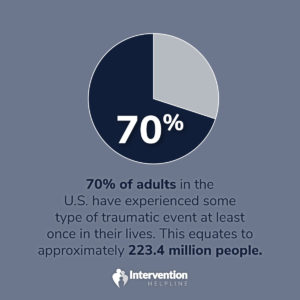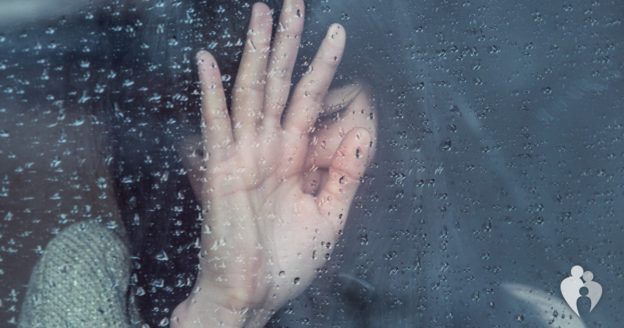People who experienced trauma and suffer from PTSD must deal with daily life differently than others. As a result, they have their defenses up most of the time and can be difficult to confront. Their reactions to daily stressors can have detrimental effects on their life by keeping them from facing the issues that they know they have. Some trauma victims become dependent on drugs and alcohol as a way to self-medicate. If problems are left unresolved, their trauma can make their future difficult. Interventions for adults with PTSD must take place with caution and sensitivity. Family members or loved ones of those suffering from PTSD should not take it upon themselves to confront those in need. Call a certified professional interventionist for PTSD to have a safe and successful intervention.
Understanding Post-traumatic Stress Disorder
 Post-traumatic stress disorder occurs when an individual experiences extreme trauma. This trauma is life-threatening, such as active battle, severe injury, sexual violence, witnessing death, or any other form of extreme violence. When in a life-threatening situation, the brain activates the fight-or-flight reflex. This reaction increases endorphins, speeds up central nervous system functioning, and heightens senses. After the event takes place, the brain should go back to normal function. In people with PTSD, this does not happen. They are stuck in a state of high alert and fear. Sometimes, drugs or alcohol temporarily allay that fear, leading to addiction. Whether to treat the addiction or the mental health disorder, professional help for PTSD sufferers is crucial to recovery.
Post-traumatic stress disorder occurs when an individual experiences extreme trauma. This trauma is life-threatening, such as active battle, severe injury, sexual violence, witnessing death, or any other form of extreme violence. When in a life-threatening situation, the brain activates the fight-or-flight reflex. This reaction increases endorphins, speeds up central nervous system functioning, and heightens senses. After the event takes place, the brain should go back to normal function. In people with PTSD, this does not happen. They are stuck in a state of high alert and fear. Sometimes, drugs or alcohol temporarily allay that fear, leading to addiction. Whether to treat the addiction or the mental health disorder, professional help for PTSD sufferers is crucial to recovery.
There are four categories of trauma experienced by those with PTSD, and trauma intervention can help with each. Intrusive symptoms can be flashbacks, memories, and dreams about the event. These symptoms cause physical and psychological reactions distress related to the traumatic event. Avoidance symptoms occur when the individual with PTSD actively avoids things that associate with the event for fear that they will trigger a reaction. Reactive symptoms are acts of aggression, exaggerated response to being startled, and self-destructive behaviors. Reactive symptoms are expressions to the individual’s constant state of alert. The fourth category is negative mood and thought changes. These symptoms can be amnesia around the circumstances of the event, chronic negative emotions, and detachment from people or activities they once enjoyed.
The symptoms of PTSD create a cycle of avoidance. Trauma-informed addiction treatment offers a way to break this cycle.
Those suffering from PTSD will avoid thoughts, memories, feelings, places, people, events, or activities that have a connection to the traumatic event. The cycle often leads those suffering to abuse drugs or alcohol and develop Substance Use Disorder (SUD).
PTSD And Addiction
The Department of Veteran Affairs estimates that 2 out of 10 veterans with PTSD have SUD as well. They also estimate that 1 out of 3 veterans that seek help with SUD have PTSD. The connection between PTSD and SUD is very strong in the veteran and civilian communities.
Reasons For Drug Abuse In People With PTSD
People with PTSD will often have trouble sleeping. Bad dreams about the traumatic event plague their sleep, or they cannot sleep at all. An easy solution to this problem is self-medicating. They believe that by taking drugs or drinking to fall asleep it is better than getting no sleep. This is a fallacy as sleep while under the influence of drugs or alcohol is not restful or helpful for the brain.
PTSD creates a feeling of numbness and disconnection from others. The loneliness prompts those with PTSD to abuse drugs, which only exacerbates this problem and further distances them from their loved ones.
Taking drugs and alcohol is a way to distract one from their problems. This is part of the cycle of avoidance. By avoiding and forgetting their problems with substance abuse, people with PTSD move themselves farther from recovery. Recovery from PTSD can only resolve by confronting and resolving the trauma. Avoiding the issues only makes them worse, prompting the individual to abuse substances more.
Signs Of Substance Abuse
- More substance used over time than originally intended.
- Difficulty cutting down or quitting use of the substance.
- Substance use interfering with school or work performance.
- Using the substance despite obvious difficulties caused by the substance.
- Abandoning hobbies or previously enjoyed activities in favor of substance use.
- Using the substance in dangerous situations, like driving.
- Continued use of the substance despite personal mental or physical damage.
- Increasing dosage of the substance to get “buzzed.”
- Withdrawal symptoms or using to avoid withdrawal symptoms
A family member considering having an intervention for their loved one suffering from PTSD should know the symptoms if substance abuse. Not all individuals suffering from PTSD have SUD. An intervention is needed to encourage an individual with PTSD seek help even without the complication of drug and alcohol abuse. If the person with PTSD also has SUD, they have a Dual Diagnosis. An intervention professional will be able to alter the approach and structure of the intervention to accommodate a Dual Diagnosis and push for recovery of both afflictions.
PTSD And SUD Intervention Strategies
An intervention professional will lead the family through the steps of the intervention process. Loved ones gathered for the intervention will need to remember that emotions run high. Rehearsing and practicing what to say is a good way to prepare and keep a level head. The best response is always with love and compassion.
After the intervention takes place and the individual accepts assistance, the interventionist will suggest a variety of treatment options based on the individual. These options will include rehab, mental health treatment, ongoing help and therapy, substance abuse treatment, drug and alcohol detox programs, and any combination of these treatments to meet the needs of the individual. All of the treatments suggested will be trauma-informed treatments, or treatments specific for those who experience trauma. Talk to a compassionate and experienced interventionist for PTSD and dependency.









 All Rights Reserved |
All Rights Reserved |